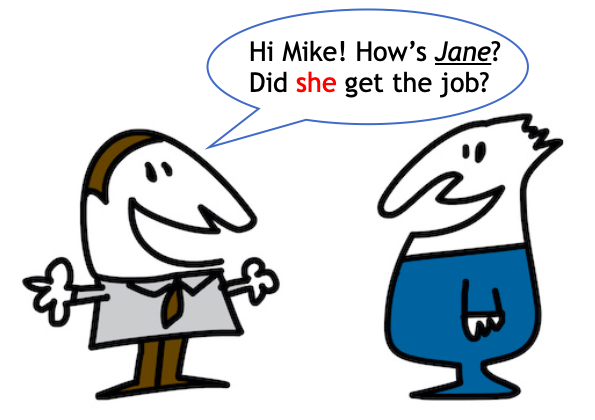- Home
- Pronoun Reference
Pronoun Reference
Pronoun reference refers to replacing a noun or noun phrase with a pronoun. It is called 'reference' because the pronoun 'refers' back (but sometimes forward) to a noun or noun phrase previously stated.
The noun or noun phrase that it refers to is called the antecedent.
It is important to be careful with this because it must be clear which noun or noun phrase the pronoun is referring back to. If it is unclear the reader may get confused.
There are several types of pronoun, such as personal, possessive, reflexive, relative, indefinite, and demonstrative, and all of these can be used for referencing.

Examples of Pronoun Reference
- John should arrive at 5pm. I hope he isn't late.
- The audience clapped loudly because they loved the show.
- My car has broken down so I'll take it to the garage tomorrow.
- Susan checked herself in the mirror before leaving.
- Neither of the men has got his hat on.
- I've got my money but Olivia forgot hers.
- Some people love horror films but I don't enjoy them.
- Mark is the guy who lives at number 15.
Problems with Pronoun Reference
Problems occur with pronoun reference if it is unclear what or who the pronoun is referring to. Take a look at this example:
Unclear:
In the bar Simon put his wallet on the table and his newspaper next to him on the chair. When he left he realised he had left it behind.
It is not clear whether 'it' refers to the wallet or the newspaper. One way to make it clear is in this case to not use the pronoun:
Clear:
In the bar Simon put his wallet on the table and his newspaper next to him on the chair. When he left he realised he had left the newspaper behind.
Here is another example of unclear pronoun reference:
Unclear:
Rachael avoids her sister when she is in a bad mood.
Does Racheal avoid her sister when she herself is in a bad mood or her sister is in a bad mood? It's not clear from the sentence. If it is referring to her sister, then it could be written this way to make it clear:
Clear:
When Rachael's sister is in a bad mood, Rachael avoids her.
It's often better to use pronouns if possible to avoid repetition but as these examples show, don't do this if it will make the sentence unclear.
You also need to be careful with pronoun antecedent agreement, which is explained below.
Pronoun Antecedent Agreement
You must make sure that your pronoun agrees with its antecedent (in other words the noun or noun phrase it is referring back to).
This is fairly easy with simple relationships such as John/he, the car/it etc. It can cause problems though when we use such words as each, neither, anyone, several etc.
The rule is that a singular pronoun must replace a singular noun and a plural pronoun must replace a plural noun. For example, if we have two nouns together, then we usually use their for the possessive pronoun:
- Anyone who is late will fail their test.
This may look right but 'anyone' is actually treated as singular so it should be:
- Anyone who is late will fail his or her test.
We need both 'his' and 'her' if we are referring to males and females (if it was a group of only males for example, then it would be 'his').
Practice and test yourself on this in the pronoun antecedent agreement quiz.
New! Comments
Any questions or comments about the grammar discussed on this page?
Post your comment here.



